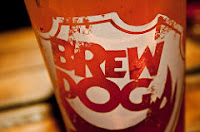[The IPKat] Open Source Dogs
16 views
Skip to first unread message
Nicola Searle
Mar 7, 2016, 9:46:09 AM3/7/16
to Ipkat_...@googlegroups.com
Monday, 7 March 2016
Open Source Dogs
 |
| Brew Dog Pint, Callum Hopkins |
Capitalism is an economic system based primarily on private ownership. People own things. IP is a capitalist hyperbole as ownership is not merely of physical things, but intangible things. This is in contrast to communism, which is government ownership, and socialism, which is collective ownership. My favourite means to explain these systems are cows.
- Capitalism - You have two cows. You sell one and buy a bull. Your herd multiplies, and the economy grows. You sell them and retire on the income.
- Socialism - You have two cows, you give one to your neighbour.
- Communism - You have two cows, the state takes both and sells you some milk.
Post-capitalism would mean a different market system, although one that is yet defined. A post-capitalist market system could be sans IP. Open source, collective IP ownership ostensibly looks like a rejection of IP, capitalism and private ownership, but a scratch under the surface suggests otherwise. Brew Dog has just published 200 detailed recipes of their microbrews. As open source approaches spread from digital media to other parts of the economy, does Does Brew Dog's recipe strategy signal the dawn of a new IP era? Probably not.
 |
| Plans for Saturday, Flickr |
A second point is that, as Brew Dog's strategy suggests, going open source can be financially rewarding in other ways. The press coverage alone must be worth the potential downside of revealing recipes. It also helps build the brewery's brand as the anti-brewery, bolster their Equity for Punks crowdfunding pitch and spur backyard brewers to try their own hand at making their recipes. It's the kind of marketing money can't buy. Beer is a hedonic product (a product that provides both pleasure and pain, as with every buzz comesliver damage), and its marketing is highly emotional. The the stick-it-to-them, iconoclastic approach of rejection of IP is likely brand-building.
This titillatingly titled paper, "Not Just Sex that Sells: Religious Rhetoric and References in Contemporary Beer Branding," argues: "The dichotomous depiction of the beer industry (dividing breweries along lines of “big” and “micro”) asserts an identification of capitalism’s preoccupation with profit. Whereas ‘big beer’ concerns itself with profit, microbreweries devote themselves to craftsmanship." Brew Dog's open source marketing is fundamentally capitalistic and defined by its rejection of 'big'.
 It's also questionable as to how much the company really loses by revealing their recipes, and if it will affect their rapid growth (Brew Dog started in 2007 and posted revenue of nearly £30M in 2014.) This Kat cannot claim to be a brewing expert, but it's hard to imagine that the home brewer will perfectly match Brew Dog's beer, or that other brewing companies lack the knowledge contained in the recipes. The branding of beer is likely more important than the beer itself and protects against price competition, and Brew Dog has not gone open source on its trade marks. All very much in keeping with capitalism.
It's also questionable as to how much the company really loses by revealing their recipes, and if it will affect their rapid growth (Brew Dog started in 2007 and posted revenue of nearly £30M in 2014.) This Kat cannot claim to be a brewing expert, but it's hard to imagine that the home brewer will perfectly match Brew Dog's beer, or that other brewing companies lack the knowledge contained in the recipes. The branding of beer is likely more important than the beer itself and protects against price competition, and Brew Dog has not gone open source on its trade marks. All very much in keeping with capitalism.Despite the image, Brew Dog's actions do not provide an alternative to capitalism and likely increase profit. But there is a problem with this analysis, it starts from capitalistic perspective and judges its outcomes from a capitalistic perspective, as do all discussions on IP. It is a reason discussions on collective ownership, such as traditional knowledge, are so problematic. But we don't seem to have a better framework.
So, dogs, cows, cheese and beer - will open source provide an alternative to capitalism? I suspect not, however it does introduce aParadox. Or, at the very least, a question mark.
[Merpel is very upset by this discussion of dogs and has decided instead to focus on brewing her next batch of Catnip Mousetrappist IPA.]
Reply all
Reply to author
Forward
0 new messages
